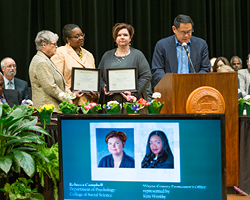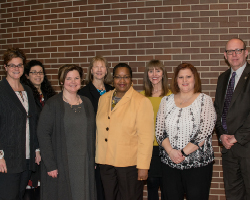Community Engagement Scholarship Award Recognizes the Detroit Sexual Assault Kit Action Research Project
- Rebecca Campbell, Ph.D.
- Professor, Department of Psychology
- College of Social Science
- Kym Worthy, J.D.
- Wayne County Prosecutor
- Wayne County, Michigan

2017 All-University Awards Convocation
The 2016-2017 Community Engagement Scholarship Award was conferred on February 7 at the MSU Awards Convocation, an annual ceremony that recognizes academic achievements from across the university.
Psychology professor Rebecca Campbell and Wayne County Prosecutor Kym Worthy were recognized on behalf of the Detroit Sexual Assault Kit (SAK) Action Research Project. The project comprises a multidisciplinary team of partners that also includes the Michigan Domestic and Sexual Violence Prevention and Treatment Board, Detroit Police Department, Michigan State Police, and Wayne County SAFE (Sexual Assault Forensic Examiners).
Background and Initial Steps
In 2009 a large number of sexual assault kits were discovered in a police property storage facility in Detroit, and the majority had never been processed for forensic DNA testing. SAKs (also known as "rape kits"), contain biological evidence collected from victims' bodies after assaults that can be analyzed for DNA. The forensic evidence can be instrumental in solving crimes, prosecuting rapists, and preventing future attacks. These SAKs had accumulated for years and, when inventoried, numbered approximately 11,000 that had not been submitted for testing.
The partners received a federal grant from the National Institute of Justice to address the problem, one of two awarded to develop model national best practices for untested rape kits. The NIJ grant called for the development of a participatory action research project. Dr. Campbell, Prosecutor Worthy, and several representatives of the collaborating organizations worked together for five years to accomplish the following:
- Assess the scope of the problem;
- Determine why Detroit amassed so many untested rape kits;
- Develop a plan for testing kits;
- Create a protocol for notifying victims and providing them with support services
Comprehensive testing plans were developed to ensure that all rape kits were tested for DNA to provide justice to survivors, hold perpetrators accountable, and ensure that those who had been wrongly accused of a crime they did not commit were exonerated through DNA testing.

2016-17 Community Engagement Scholarship Award Recipients -- Rebecca Campbell, MSU Professor, and Kym Worthy, Wayne County Prosecutor, with members of the Detroit Sexual Assault Kit Action Research Project
Empirical Research
A complex stratified random sampling design was implemented, selecting 1,595 SAKs for forensic testing. The DNA testing from those kits was uploaded into the federal criminal DNA database to look for matches to an offender's DNA profile (solving or confirming the offender's identity). The DNA information also produced multiple matches across multiple sexual assault cases, indicating multiple offenders were serial rapists.
The empirical research led to a number of significant policy, practice, and legislative changes. Among them:
- Testing all remaining Detroit SAKs—The Michigan Attorney General's Office allocated $4 million to test the approximately 11,000 previously untested SAKs in Detroit.
- Implementing new SAK testing policies—All current-case SAKs in Wayne County must be submitted for DNA testing.
- Training for practitioners—All Detroit-area police, prosecutors, medical/nursing, and victim advocacy staff have received new training on trauma-informed best practices.
- Establishing a new cold case sexual assault unit—A federal Grants to Encourage Arrest Award to the Wayne County Prosecutor's Office was used to establish a new cold case sexual assault investigation and prosecution unit.
- Creating new partnerships for sustainability—The Michigan Women's Foundation and Detroit Crime Commission created Enough SAID (Enough Sexual Assault in Detroit) to raise public awareness and fund investigation, prosecution, and victim services.
- Passing new legislation—New Michigan legislation requires that all SAKs released to law enforcement agencies must be submitted for DNA testing (MI Act 227 of Public Acts 2014).
Best Practices
Other communities across the U.S. are affected by accumulating SAKs that have not yet been tested. The work of the Detroit project team was extensively documented to provide empirical research that can guide public policy on rape kit testing.
Campbell and the team have published seven peer-reviewed articles in top-tier journals, as well as additional articles currently under review. Post-doc and graduate student co-authors are included in a majority of those articles. They have shared their work in academic conference presentations before the American Society of Criminology, American Evaluation Association, American Psychological Association, and the Joint Statistical Meetings Conference.
In addition, they collaborated with colleagues at the National Institute of Justice to participate in a national webinar about the project and its impacts for the Harvard University Ash Center for Democratic Governance and Innovation.
Exemplary Engaged Scholarship with Community Partners
The Community Engagement Scholarship Award (CESA) is conferred annually on an MSU researcher in recognition of highly engaged community-based scholarship collaborations that positively impact both the community and scholarship. The honor is bestowed by the President, Provost, and representatives of the MSU Board of Trustees during the annual all-university MSU Awards Convocation.
The winning CESA partnership each year goes on to represent MSU in the competition for the regional W.K. Kellogg Foundation Community Engagement Scholarship Awards and the national C. Peter Magrath Community Engagement Scholarship Award. These are among the most prestigious recognitions of exemplary engaged scholarship in the United States. The award process is administered by the Association of Public and Land-grant Universities (APLU) and the Engagement Scholarship Consortium (ESC).
MSU faculty, administrators, colleagues, students, or community partners can initiate nominations for the Community Engagement Scholarship Award. Applications must be submitted to the dean or administrator of the nominee's major administrative unit to be forwarded for University-level consideration.
CESA instructions are posted by the Office of the Provost each year in late March or early April, with submission deadlines due each October.
- Written by Carla Hills, University Outreach and Engagement
- Photographs courtesy of Paul Phipps, University Outreach and Engagement